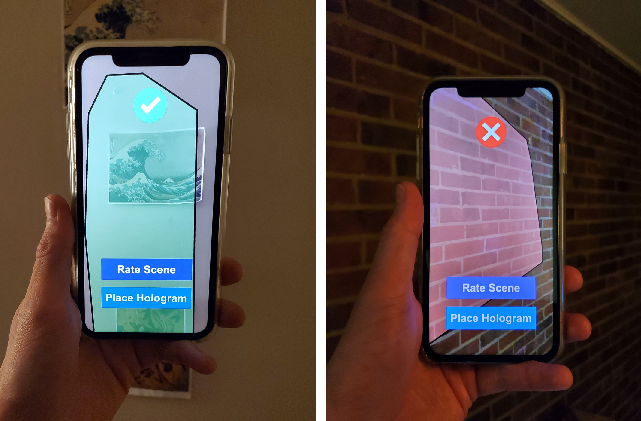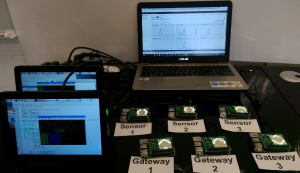I lead the Duke University Intelligent Interactive Internet of Things (I^3T) Lab. As of May 2025, the up to date information about lab’s research is provided on the Duke I3T Lab website. This webpage is no longer maintained.
The lab works in the cross-disciplinary area currently known as the Internet of Things (IoT). The long-term vision of our research is taking the IoT to the point where intelligent, reliable, adaptive collaborative IoT deployments can be created near-automatically beginning-to-end, from hardware form factor generation to communication support and cloud infrastructure specifications. Our research can be seen as covering two key sub-components of this vision: (1) making IoT deployments more capable (e.g., more energy-independent, more intelligent, more readily deployable in commonplace environments, more readily accessible to the users), and (2) automating IoT design decisions currently done via engineering trial and error (e.g., automating the logic behind data rate and protocol selection and task separation decisions).
The current focus of our work is on enabling robust perception of the real world in mobile systems and the IoT. This work encompasses multiple elements of perception, such as spatial, semantic, and user state awareness, and deals with numerous limitations of low-end systems such as low-quality sensor data, mismatches between reference (training) conditions and conditions experienced in the real world, difficulty in obtaining necessary reference data for algorithm training, and computation and communication resource constraints. Our key next-generation mobile system of interest is mobile augmented reality (AR); our research lays the foundation for making AR intelligent, robust, and context-aware. We are also applying our robust perception algorithms to other types of next-generation mobile systems, including virtual reality and networks of drones.
Enabling next-generation augmented reality with edge computing and the Internet of Things: Current augmented reality deployments have multiple limitations that need to be overcome for AR to become a practical pervasive technology. These limitations include high energy consumption, limited multi-user experiences, and overall lack of robustness and intelligence. We are currently exploring a range of approaches for improving augmented reality experiences with edge computing and the Internet of Things, including making the experiences more adaptive and intelligent, more secure, and enabling advanced communication and networking support for them. Prof. Gorlatova’s vision for intelligent augmented reality has been summarized in a Network World article available here. In 2021 Prof. Gorlatova received the NSF CAREER Award to build the foundations of IoT-supported mobile AR.
 Selected related publications:
Selected related publications:
- Y. Chen, H. Inaltekin, M. Gorlatova, AdaptSLAM: Edge-assisted Adaptive SLAM with Resource Constraints via Uncertainty Minimization, accepted to IEEE INFOCOM’23, Jersey City, NJ, May 2023. (19.2% acceptance rate). [Paper PDF]
- T. Scargill, Y. Chen, N. Marzen, M. Gorlatova, Integrated Design of Augmented Reality Spaces Using Virtual Environments, in Proc. IEEE ISMAR’22, Oct. 2022 (21% acceptance rate). [ Paper PDF ]
- Y. Zhang, T. Scargill, A. Vaishnav, G. Premsankar, M. Di Francesco, M. Gorlatova, InDepth: Real-time Depth Inpainting for Mobile Augmented Reality, in Proc. ACM IMWUT’22. [PDF]
- T. Scargill, J. Chen, M. Gorlatova, Here to Stay: Measuring Hologram Stability in Markerless Smartphone Augmented Reality. arXiv: 2109.14757, Sept. 2021.
- Z. Liu, G. Lan, J. Stojkovic, Y. Zhang, C. Joe-Wong, M. Gorlatova, CollabAR: Edge-assisted Collaborative Image Recognition for Mobile Augmented Reality, IEEE IPSN’20, April 2020. [ Paper PDF ] IPSN Best Research Artifact Award
- S. Ahn, M. Gorlatova, P. Naghizadeh, M. Chiang, P. Mittal, Adaptive Fog-based Output Security for Augmented Reality, in Proc. ACM SIGCOMM VR/AR Network Workshop, Budapest, Hungary, Aug. 2018. [Paper PDF]
Related media coverage:
- The Dawning of the Age of the Metaverse, October 2022. Duke ECE Magazine cover story.
- Augmented Reality, Fog, and Vision: Duke Professor Outlines Importance of Smart Architectures, Network World, 2018.
Intelligence on the edge: Bringing advanced intelligence close to the end users with edge and fog computing can help IoT to live up to its fullest potential. However, it is far from trivial to adapt both training and inference algorithms to the constraints of edge systems, and to figure out how to best exploit the advantages of both edge nodes and cloud components of the overall IoT systems. We are currently exploring multiple directions in adapting different machine learning algorithms to collaborative edge/fog conditions. This research will enable the next level of interactivity and cognition in Internet of Things deployments, while also reducing network loads and energy consumption associated with machine learning algorithms.
Selected related publications:
- P. Naghizadeh, M. Gorlatova, A. Lan, M. Chiang, Hurts to be Too Early: Benefits and Drawbacks of Communication in Multi-agent Learning, in Proc. IEEE INFOCOM, Paris, France, May 2019 (19.7% acceptance rate). [Paper PDF]
- Y. Ruan, L. Zheng, M. Gorlatova, M. Chiang, C. Joe-Wong, The Economics of Fog Computing: Pricing Tradeoffs for Distributed Data Analytics, Fognet and Fogonomics, Wiley, in print, 2019 (invited book chapter).
- T. Chang, L. Zheng, M. Gorlatova, C. Gitau, C.-Y. Huang, M. Chiang, Demo: Decomposing Data Analytics in Fog Networks, in Proc. ACM SenSys’17, Delft, Netherlands, Nov. 2017. [Demo abstract PDF] [Video of the demo]
Aiding Internet of Things communications and control with smart gateways: Currently, many elements of communications, networking, and control in the Internet of Things are statically pre-configured. We are exploring how smart gateways can aid in automatic protocol selection, bandwidth allocation, functionality placement, automatic management of network resource reservations, and other adaptive on-demand behavior in IoT systems. Among other techniques, we are examining the applications of reinforcement learning in these contexts. This research will lead to increased capabilities and reduced energy consumption in the IoT systems, and will enable supporting the combination of ultra-low-latency and high-bandwidth communications that are required in modern practical IoT deployments.
Related publications:
- M. Gorlatova, H. Inaltekin, M. Chiang, Characterizing Task Completion Latencies in Fog Computing, arXiv:1811.02638, Nov. 2018.
- H. Inaltekin, M. Gorlatova, M. Chiang, Virtualized Control over Fog: Interplay between Reliability and Latency, IEEE Internet of Things Journal, Vol. 5, No. 6, 2018. [Paper PDF]
- S. Ahn, M. Gorlatova, P. Naghizadeh, M. Chiang, P. Mittal, Adaptive Fog-based Output Security for Augmented Reality, in Proc. ACM SIGCOMM VR/AR Network Workshop, Budapest, Hungary, Aug. 2018. [Paper PDF] [Princeton Engineering video]
Next-generation context-aware AR applications: Robust and context-aware AR architectures we are developing will support a broad range of applications of AR across multiple industries such as gaming, retail, and education. They will also pave way for safety-critical applications of AR. Our recent work has been exploring surgical applications of context-aware AR, and applications of next-generation AR in supporting uses’ health and well-being.
Related publications:
- S. Eom, D. Sykes, S. Rahimpour, M. Gorlatova, NeuroLens: Augmented Reality-based Contextual Guidance through Surgical Tool Tracking in Neurosurgery, in Proc. IEEE ISMAR’22, Oct. 2022 (21% acceptance rate). [ Paper PDF ]
- S. Eom, S. Kim, Y. Jiang, R. Chen, A. Roghanizad, M. Z. Rosenthal, J. Dunn, M. Gorlatova, Investigation of Thermal Perception and Emotional Response in Augmented Reality using Digital Biomarkers: A Pilot Study, to appear in Proc. IEEE XR for Healthcare and Wellbeing Workshop (co-located with IEEE VR’23), Shanghai, China, Mar. 2022.
- S. Eom, M. Hadziahmetovic, M. Pajic, M. Gorlatova, Demo: Through an AR Lens: Augmented Reality Magnification through Feature Detection and Matching, in Proc. ACM SenSys’22, Boston, MA, Nov. 2022. [Demo abstract PDF]
- T. Scargill, Y. Chen, S. Eom, J. Dunn, M. Gorlatova, Environmental, User, and Social Context-Aware Augmented Reality for Supporting Personal Development and Change, in Proc. IEEE Workshop for Building the Foundations of the Metaverse, Mar. 2022 (co-located with IEEE VR’22). [Paper PDF]
Industry and public engagement: We place emphasis on making code, data, and experimental how-to guides widely available for a wider scientific community, and on developing long-term industry collaborations. We are particularly excited about developing opportunities for seamless transfer of research to industry-wide deployments, such as contributing edge computing-related developments to the EdgeX Foundry open source project. Prof. Gorlatova has also previously advised IoT startups in the fitness and wellness space.
Related work:
- Nov. 2022: Ying Chen’s and Tim Scargill’s Hitachi America R&D presentations.
- Feb. 2022: Presentation to Augmented Reality for Enterprise Alliance (AREA), a global non-profit dedicated to widespread adoption of AR-enabled enterprise systems.
- Nov. 2021: Presentation at AWE USA, top AR/VR industry conference.
- May 2019: Presentation at the Coalition for National Security Research’s (CNSR) Science, Technology, and Innovation Exchange (STIx) on the Hill Briefing held in Rayburn House Office Building in Washington, DC. [ Event photos ]
- Feb. 2019: Invited talk at the Industrial Internet Consortium (IIC) Technology Working Group meeting in Raleigh, NC.
- Aug. 2018: Women in Tech Show podcast: Edge Computing with Maria Gorlatova.
- Dec. 2017: Embedded.fm podcast: When Toasters Attack.
- Nov. 2017: Fog Support for Autonomous Driving use case description whitepaper, developed in collaboration with Intel, CISCO, Microsoft, RTI, and Hitachi representatives.
Previous research:
Prof. Gorlatova’s Ph.D. research focused on developing energy harvesting active networked tags for ubiquitous networking of commonplace objects in the Internet of Things [Dissertation PDF]. This research was recognized with the 2016 IEEE Communications Society Young Author Best Paper Award, the 2011 ACM SenSys Best Student Demonstration Award, and the 2011 IEEE Communications Society Award for Advances in Communications. More information about this work: EnHants, energy harvesting, prototypes and the testbed we developed.
Prof. Gorlatova’s M.Sc. and early industry research, in both US and Canada, focused on security and privacy in wireless and mobile networks. [All publications] She remains passionate about building pervasive systems that are secure, safe, and reliable. Duke University I3T Lab has multiple projects that incorporate these elements, and is collaborating with experts in security and privacy in several lines of ongoing work.

